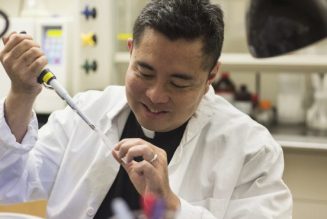8 Minute Read
At the heart of the best stories are questions that ask about human nature: What does it mean to be human? We were given one of those stories in the Oscar-winning Spider-man: Into the Spider-Verse. It’s an instance of the age-old “coming-of-age” narratives, which are interesting because they particularize the question, “What does it mean to be human?” into the question, “What does it mean to be a man, and how does a boy become one?” In Spider-Verse’s case, one can’t help but notice that it hones in on the role that fatherhood plays in answering the latter question. Fatherhood lies at the very heart of manhood and it is what gives this film its soul. The movie has been rightly praised for its distinct art and animation style, but these are only meant to draw the audience into the film’s more philosophical queries, not least of which is the importance of a good father. And the film does not take much time to introduce this theme to the audience.
Few parts of a film are more important than its first several minutes. Part of what makes Spider-Verse so narratively good, then, is that when the audience is introduced to Miles Morales, it does not take very long for Miles’s father, Jeff Davis, to come into the picture. Thus, the audience’s first impression of Miles, around whom the plot revolves, includes his father. One, then, immediately gets the sense that Miles’s relationship with his father will be significant in this film. Their first major exchange, then, is quite revealing:
Miles: “Don’t cops run red lights?”
Jeff: “Yeah, some do. But not your dad.”
Immediately the audience sees the kind of man that Jeff is, and how starkly different that kind of man is from his brother, Aaron, whom Miles looks up to more than he does Jeff.
Jeff: “You want to end up like your uncle?”
Miles: “What’s wrong with uncle Aaron? He’s a good guy.”
Jeff pauses. “We all make choices in life.”
Miles: “It doesn’t feel like I have a choice right now—”
Jeff: “You don’t!”
One might brush off this exchange as the typical conversation a teenager might have with his dad, but it introduces a central theme. It reveals that Miles tends to be drawn more to his uncle Aaron, a criminal, than to his own father, a police officer, and that, naturally, his father wishes that wasn’t the case. Thus, we learn that because Miles does not like the father figure that was given to him, he seeks to find it in his uncle. This motivation carries over into the rest of the film: for the rest of the movie, Miles tries to fill the void in his life that only his real father can fill; but when he allows his father to do so, it changes his inner world.
Miles’s situation here gives us occasion to pause and reflect on the function of a father. Parents in general naturally desire that their children achieve the human good. But this, of course, requires having an understanding of what it means to be human. Hence, part of what it means to be a parent is teaching one’s children what it means to be human. Fathers, then, if they have a son, have the distinct duty to, on their way to teaching them what it means to be human, teach them what it means to be a man, in particular. The mother, as important as she is, cannot do this. (Similarly, it belongs to the mother to show her daughter what it means to be a woman, which the father cannot do.)
This is the void that Miles must fill. Thus, there are several moments, too many to enumerate here, in which we can see Miles’s father try to encourage Miles towards what he thinks it means to be a man, which is starkly different from what uncle Aaron thinks it means to be a man. This distinction between Aaron and Jeff makes Miles’s journey toward finding a father figure much more interesting. First, it must be granted that uncle Aaron clearly cares for Miles quite a lot. But the fact that he is a criminal is a sign that his view of the human good—and probably that of human nature—is skewed. We can see this when Aaron does not chastise Miles at all for sneaking out of his dorm (for which he does get chastised later by a school security guard) and encourages him to graffiti. Hence, his fatherly role in Miles’s life is fulfilled only imperfectly. This isn’t to say that Jeff, Miles’s real father, does fulfill it perfectly. But Jeff is clearly more fit to fulfill it than Aaron, not only because Jeff is Miles’s real father, but because he is a police officer, a sign that his intuitive understanding of the human good is better than Aaron’s. We even see Jeff explicitly encourage Miles to stay at school and chastise him for his graffiti—the direct opposite of what Aaron taught him.
This is exemplified in a small scene after Miles gets his powers. After Miles is bitten by the spider and he begins to show the classic “Spider-Man symptoms,” he finds himself with a whole new set of questions that neither Jeff nor Aaron can answer. But, naturally, he seeks them out for guidance nonetheless. Of course, he first calls uncle Aaron, but there’s no answer. He then reluctantly calls his father, but hangs up before it reaches him. This small scene is emblematic of his relationship to his two father figures. He prefers Aaron, but Aaron simply cannot live up to the role that Miles needs. That role can only be filled by Jeff, his real father, but their relationship is currently too flawed for him to have the right effect. And yet, after Miles watches the Spider-Man of his dimension die just after he was given a mission to save Brooklyn from complete destruction at the hands of Kingpin, scared and distraught, he runs straight home—into the arms of none other than his father.
Now Miles is left alone to figure out what it means to be Spider-Man (which, I might add, is emblematic of how he feels left alone to figure out what it means to be a man), but after some attempts he realizes how difficult it is and comes close to giving up. Enter Peter B. Parker, his third father figure. Of the three, Peter is probably the most interesting because unlike the other two, he has no desire to be a father—either to Miles or even in his own personal life (which in fact is the reason for his divorce from Mary Jane in his own dimension). This sets him up for a beautiful arc. I say it’s beautiful because the movie does not shy away from suggesting that it is in fact good for Peter to want to be a father: it is at the end of his character arc—when a character is supposed to have developed and changed for the better—that, because of his relationship with Miles, he now realizes how good it is to be a father. When he first meets Miles, he is very reluctant to teach him anything about being Spider-Man and only decides to do so out of guilt. But as the movie progresses, we see him in fact take delight in teaching Miles, and by the end, he takes the most delight in seeing Miles finally become his own Spider-Man.
And yet, interestingly, the filmmakers did not decide to make Peter the catalyst for Miles’s turning point—Miles’s turn from boyhood and an imperfect Spider-Man, to a man. After Aaron’s tragic death, Miles finds in himself on a tightrope, tottering between wanting to take down Kingpin simply out of vengeance, and for the good of the city. Peter knows this is the case, but he also knows that Miles simply is not ready and that the best he can do is leave him to let Miles’s moment happen on its own.
Miles: “When will I know I’m ready?”
Peter: “You won’t. It’s a leap of faith. That’s all it is, Miles. A leap of faith.”
Soon after, Jeff shows up at Miles’s door. No, it’s not Spider-Man who brings about Miles’s turning point. It is his father:
Jeff: “Look, sometimes people drift apart, Miles. And I don’t want that to happen to us, okay? Look, I know I don’t always do what you need me to do or say what you need me to say but I… I see this spark in you, it’s amazing! It’s why I push you, but it’s yours. Whatever you choose to do with it, you’ll be great. Look, call me when you can, okay? I love you. You don’t have to say it back.”
The next sequence is perhaps the best in the movie, even better than when Miles defeats Kingpin. For these words, almost miraculously, suddenly give Miles what he needs—whatever that is—to gain both control of his powers and what he needs to become not only a superhero, but a man. The audience watches him take his “leap of faith” as “What’s Up Danger,” plays in the background, signifying Miles’s newfound courage—the virtue perhaps most characteristic of manhood—that allows him to undergo his transformation.
With this courage and control over his powers, Miles now has what it takes to take on Kingpin. After sending the other Spider-people home, Miles is left to face Kingpin by himself. But of course, there is no important sequence in this film that can happen without one of Miles’s father figures present, so we see Jeff watching Spider-Man, without knowing it’s his son, fight Kingpin. But at the height of the battle, when all seems lost, we get the following very important exchange between Kingpin and Miles:
Kingpin: “You took my family. Now, I’m gonna make sure you never see yours again.”
Kingpin then slams Miles, similar to how he killed the first Spider-Man, but it doesn’t kill Miles. Instead, Miles is able to open his eyes just enough to see his father in the distance who is urging him on, saying, “Get up, Spider-Man!” I’m not sure if we are supposed to think that Miles could hear this (it’s seems unlikely given the distance and that Jeff sort of whispered it), but even if he didn’t, upon seeing him, Miles is driven by his love for his father to “get back up”—another major theme in the movie, and another sign of manhood—and reply to Kingpin:
Miles: “I’ll always have my family. You ever hear of the shoulder touch?”
He then puts his hand on Kingpin’s shoulder, a move he learned from uncle Aaron (albeit for quite a different purpose), and venom-strikes him, allowing Miles to ultimately defeat him.
Now, I’d like to be clear here: by saying that uncle Aaron was an imperfect father figure to Miles, I do not mean that Aaron was an all-around horrible one. Aaron knows that it would not be good for Miles to know the nature of his criminality, and for this reason he keeps the fact that he is the Prowler from Miles. And even with Aaron’s influence, Miles is clearly not a total degenerate; but that’s not to say Aaron is a good influence: with a good father figure, Miles probably wouldn’t sneak out of his dorm and paint graffiti. Furthermore, Aaron seems to have no qualms about murdering someone on Kingpin’s command (unless it’s someone he knows). As I’ve said before, such a man cannot have a proper conception of the human good, which is necessary for being a good father figure.
Speaking of Kingpin, even he has the notion of fatherhood built into his character: the very reason for all of his actions is to bring his family back, so clearly he cares about his family a great deal. But the fact that he is willing to destroy all of Brooklyn to do so shows that his idea of the human good is definitely corrupted: he puts his own private good before the good of the whole city, which is evil.
My point is this: even if Aaron is not an all-around horrific person (at least in relation to Miles), and even if Kingpin’s motives (taken in isolation) are somewhat wholesome, it is extremely difficult—I might even say nearly impossible—to be both a criminal and a good father figure.
This is why Jeff’s character being a police officer, the direct opposite of a criminal, is so important, as I’ve mentioned: it shows that his conception of the human good is far more conducive to fatherhood than Aaron and Kingpin’s. For it is a police officer’s duty to put his life on the line for the good of those around him, something a father is called to do as well when those around him are his family.
Spider-Man: Into the Spider-Verse is a brilliant film that absolutely deserved the Oscar it won. Many, especially now, will want to attribute this to something about race. But that would make the film less than it is. In fact, Miles’s race never seems to be explicitly acknowledged; no one in the film ever shows any concern over the color of Miles’s skin. Rather, what makes this film so brilliant is that it is chock full of themes about fatherhood and the enormous difference a good father can make on a young man’s life, a lesson the world sorely needs right now.
Sign-up below to access the complete first issue of Finnian and the Seven Mountains and also receive our FREE e-mail newsletter that features our latest articles, projects and publications.
.formkit-form[data-uid=”6218b20922″] *{box-sizing:border-box;}.formkit-form[data-uid=”6218b20922″]{-webkit-font-smoothing:antialiased;-moz-osx-font-smoothing:grayscale;}.formkit-form[data-uid=”6218b20922″] legend{border:none;font-size:inherit;margin-bottom:10px;padding:0;position:relative;display:table;}.formkit-form[data-uid=”6218b20922″] fieldset{border:0;padding:0.01em 0 0 0;margin:0;min-width:0;}.formkit-form[data-uid=”6218b20922″] body:not(:-moz-handler-blocked) fieldset{display:table-cell;}.formkit-form[data-uid=”6218b20922″] h1,.formkit-form[data-uid=”6218b20922″] h2,.formkit-form[data-uid=”6218b20922″] h3,.formkit-form[data-uid=”6218b20922″] h4,.formkit-form[data-uid=”6218b20922″] h5,.formkit-form[data-uid=”6218b20922″] h6{color:inherit;font-size:inherit;font-weight:inherit;}.formkit-form[data-uid=”6218b20922″] p{color:inherit;font-size:inherit;font-weight:inherit;}.formkit-form[data-uid=”6218b20922″] ol:not([template-default]),.formkit-form[data-uid=”6218b20922″] ul:not([template-default]),.formkit-form[data-uid=”6218b20922″] blockquote:not([template-default]){text-align:left;}.formkit-form[data-uid=”6218b20922″] p:not([template-default]),.formkit-form[data-uid=”6218b20922″] hr:not([template-default]),.formkit-form[data-uid=”6218b20922″] blockquote:not([template-default]),.formkit-form[data-uid=”6218b20922″] ol:not([template-default]),.formkit-form[data-uid=”6218b20922″] ul:not([template-default]){color:inherit;font-style:initial;}.formkit-form[data-uid=”6218b20922″][data-format=”modal”]{display:none;}.formkit-form[data-uid=”6218b20922″][data-format=”slide in”]{display:none;}.formkit-form[data-uid=”6218b20922″][data-format=”sticky bar”]{display:none;}.formkit-sticky-bar .formkit-form[data-uid=”6218b20922″][data-format=”sticky bar”]{display:block;}.formkit-form[data-uid=”6218b20922″] .formkit-input,.formkit-form[data-uid=”6218b20922″] .formkit-select,.formkit-form[data-uid=”6218b20922″] .formkit-checkboxes{width:100%;}.formkit-form[data-uid=”6218b20922″] .formkit-button,.formkit-form[data-uid=”6218b20922″] .formkit-submit{border:0;border-radius:5px;color:#ffffff;cursor:pointer;display:inline-block;text-align:center;font-size:15px;font-weight:500;cursor:pointer;margin-bottom:15px;overflow:hidden;padding:0;position:relative;vertical-align:middle;}.formkit-form[data-uid=”6218b20922″] .formkit-button:hover,.formkit-form[data-uid=”6218b20922″] .formkit-submit:hover,.formkit-form[data-uid=”6218b20922″] .formkit-button:focus,.formkit-form[data-uid=”6218b20922″] .formkit-submit:focus{outline:none;}.formkit-form[data-uid=”6218b20922″] .formkit-button:hover > span,.formkit-form[data-uid=”6218b20922″] .formkit-submit:hover > span,.formkit-form[data-uid=”6218b20922″] .formkit-button:focus > span,.formkit-form[data-uid=”6218b20922″] .formkit-submit:focus > span{background-color:rgba(0,0,0,0.1);}.formkit-form[data-uid=”6218b20922″] .formkit-button > span,.formkit-form[data-uid=”6218b20922″] .formkit-submit > span{display:block;-webkit-transition:all 300ms ease-in-out;transition:all 300ms ease-in-out;padding:12px 24px;}.formkit-form[data-uid=”6218b20922″] .formkit-input{background:#ffffff;font-size:15px;padding:12px;border:1px solid #e3e3e3;-webkit-flex:1 0 auto;-ms-flex:1 0 auto;flex:1 0 auto;line-height:1.4;margin:0;-webkit-transition:border-color ease-out 300ms;transition:border-color ease-out 300ms;}.formkit-form[data-uid=”6218b20922″] .formkit-input:focus{outline:none;border-color:#1677be;-webkit-transition:border-color ease 300ms;transition:border-color ease 300ms;}.formkit-form[data-uid=”6218b20922″] .formkit-input::-webkit-input-placeholder{color:inherit;opacity:0.8;}.formkit-form[data-uid=”6218b20922″] .formkit-input::-moz-placeholder{color:inherit;opacity:0.8;}.formkit-form[data-uid=”6218b20922″] .formkit-input:-ms-input-placeholder{color:inherit;opacity:0.8;}.formkit-form[data-uid=”6218b20922″] .formkit-input::placeholder{color:inherit;opacity:0.8;}.formkit-form[data-uid=”6218b20922″] [data-group=”dropdown”]{position:relative;display:inline-block;width:100%;}.formkit-form[data-uid=”6218b20922″] [data-group=”dropdown”]::before{content:””;top:calc(50% – 2.5px);right:10px;position:absolute;pointer-events:none;border-color:#4f4f4f transparent transparent transparent;border-style:solid;border-width:6px 6px 0 6px;height:0;width:0;z-index:999;}.formkit-form[data-uid=”6218b20922″] [data-group=”dropdown”] select{height:auto;width:100%;cursor:pointer;color:#333333;line-height:1.4;margin-bottom:0;padding:0 6px;-webkit-appearance:none;-moz-appearance:none;appearance:none;font-size:15px;padding:12px;padding-right:25px;border:1px solid #e3e3e3;background:#ffffff;}.formkit-form[data-uid=”6218b20922″] [data-group=”dropdown”] select:focus{outline:none;}.formkit-form[data-uid=”6218b20922″] [data-group=”checkboxes”]{text-align:left;margin:0;}.formkit-form[data-uid=”6218b20922″] [data-group=”checkboxes”] [data-group=”checkbox”]{margin-bottom:10px;}.formkit-form[data-uid=”6218b20922″] [data-group=”checkboxes”] [data-group=”checkbox”] *{cursor:pointer;}.formkit-form[data-uid=”6218b20922″] [data-group=”checkboxes”] [data-group=”checkbox”]:last-of-type{margin-bottom:0;}.formkit-form[data-uid=”6218b20922″] [data-group=”checkboxes”] [data-group=”checkbox”] input[type=”checkbox”]{display:none;}.formkit-form[data-uid=”6218b20922″] [data-group=”checkboxes”] [data-group=”checkbox”] input[type=”checkbox”] + label::after{content:none;}.formkit-form[data-uid=”6218b20922″] [data-group=”checkboxes”] [data-group=”checkbox”] input[type=”checkbox”]:checked + label::after{border-color:#ffffff;content:””;}.formkit-form[data-uid=”6218b20922″] [data-group=”checkboxes”] [data-group=”checkbox”] input[type=”checkbox”]:checked + label::before{background:#10bf7a;border-color:#10bf7a;}.formkit-form[data-uid=”6218b20922″] [data-group=”checkboxes”] [data-group=”checkbox”] label{position:relative;display:inline-block;padding-left:28px;}.formkit-form[data-uid=”6218b20922″] [data-group=”checkboxes”] [data-group=”checkbox”] label::before,.formkit-form[data-uid=”6218b20922″] [data-group=”checkboxes”] [data-group=”checkbox”] label::after{position:absolute;content:””;display:inline-block;}.formkit-form[data-uid=”6218b20922″] [data-group=”checkboxes”] [data-group=”checkbox”] label::before{height:16px;width:16px;border:1px solid #e3e3e3;background:#ffffff;left:0px;top:3px;}.formkit-form[data-uid=”6218b20922″] [data-group=”checkboxes”] [data-group=”checkbox”] label::after{height:4px;width:8px;border-left:2px solid #4d4d4d;border-bottom:2px solid #4d4d4d;-webkit-transform:rotate(-45deg);-ms-transform:rotate(-45deg);transform:rotate(-45deg);left:4px;top:8px;}.formkit-form[data-uid=”6218b20922″] .formkit-alert{background:#f9fafb;border:1px solid #e3e3e3;border-radius:5px;-webkit-flex:1 0 auto;-ms-flex:1 0 auto;flex:1 0 auto;list-style:none;margin:25px auto;padding:12px;text-align:center;width:100%;}.formkit-form[data-uid=”6218b20922″] .formkit-alert:empty{display:none;}.formkit-form[data-uid=”6218b20922″] .formkit-alert-success{background:#d3fbeb;border-color:#10bf7a;color:#0c905c;}.formkit-form[data-uid=”6218b20922″] .formkit-alert-error{background:#fde8e2;border-color:#f2643b;color:#ea4110;}.formkit-form[data-uid=”6218b20922″] .formkit-spinner{display:-webkit-box;display:-webkit-flex;display:-ms-flexbox;display:flex;height:0px;width:0px;margin:0 auto;position:absolute;top:0;left:0;right:0;width:0px;overflow:hidden;text-align:center;-webkit-transition:all 300ms ease-in-out;transition:all 300ms ease-in-out;}.formkit-form[data-uid=”6218b20922″] .formkit-spinner > div{margin:auto;width:12px;height:12px;background-color:#fff;opacity:0.3;border-radius:100%;display:inline-block;-webkit-animation:formkit-bouncedelay-formkit-form-data-uid-6218b20922- 1.4s infinite ease-in-out both;animation:formkit-bouncedelay-formkit-form-data-uid-6218b20922- 1.4s infinite ease-in-out both;}.formkit-form[data-uid=”6218b20922″] .formkit-spinner > div:nth-child(1){-webkit-animation-delay:-0.32s;animation-delay:-0.32s;}.formkit-form[data-uid=”6218b20922″] .formkit-spinner > div:nth-child(2){-webkit-animation-delay:-0.16s;animation-delay:-0.16s;}.formkit-form[data-uid=”6218b20922″] .formkit-submit[data-active] .formkit-spinner{opacity:1;height:100%;width:50px;}.formkit-form[data-uid=”6218b20922″] .formkit-submit[data-active] .formkit-spinner ~ span{opacity:0;}.formkit-form[data-uid=”6218b20922″] .formkit-powered-by[data-active=”false”]{opacity:0.35;}@-webkit-keyframes formkit-bouncedelay-formkit-form-data-uid-6218b20922-{0%,80%,100%{-webkit-transform:scale(0);-ms-transform:scale(0);transform:scale(0);}40%{-webkit-transform:scale(1);-ms-transform:scale(1);transform:scale(1);}}@keyframes formkit-bouncedelay-formkit-form-data-uid-6218b20922-{0%,80%,100%{-webkit-transform:scale(0);-ms-transform:scale(0);transform:scale(0);}40%{-webkit-transform:scale(1);-ms-transform:scale(1);transform:scale(1);}}.formkit-form[data-uid=”6218b20922″] blockquote{padding:10px 20px;margin:0 0 20px;border-left:5px solid #e1e1e1;} .formkit-form[data-uid=”6218b20922″]{border:1px solid #e3e3e3;max-width:700px;position:relative;overflow:hidden;}.formkit-form[data-uid=”6218b20922″] .formkit-background{width:100%;height:100%;position:absolute;top:0;left:0;background-size:cover;background-position:center;opacity:0.3;}.formkit-form[data-uid=”6218b20922″] [data-style=”minimal”]{padding:20px;width:100%;position:relative;}.formkit-form[data-uid=”6218b20922″] .formkit-header{margin:0 0 27px 0;text-align:center;}.formkit-form[data-uid=”6218b20922″] .formkit-subheader{margin:18px 0;text-align:center;}.formkit-form[data-uid=”6218b20922″] .formkit-guarantee{font-size:13px;margin:10px 0 15px 0;text-align:center;}.formkit-form[data-uid=”6218b20922″] .formkit-guarantee > p{margin:0;}.formkit-form[data-uid=”6218b20922″] .formkit-powered-by{color:#7d7d7d;display:block;font-size:12px;margin:10px 0 0 0;text-align:center;}.formkit-form[data-uid=”6218b20922″] .formkit-fields{display:-webkit-box;display:-webkit-flex;display:-ms-flexbox;display:flex;-webkit-flex-wrap:wrap;-ms-flex-wrap:wrap;flex-wrap:wrap;margin:25px auto 0 auto;}.formkit-form[data-uid=”6218b20922″] .formkit-field{min-width:220px;}.formkit-form[data-uid=”6218b20922″] .formkit-field,.formkit-form[data-uid=”6218b20922″] .formkit-submit{margin:0 0 15px 0;-webkit-flex:1 0 100%;-ms-flex:1 0 100%;flex:1 0 100%;}.formkit-form[data-uid=”6218b20922″][min-width~=”600″] [data-style=”minimal”]{padding:40px;}.formkit-form[data-uid=”6218b20922″][min-width~=”600″] .formkit-fields[data-stacked=”false”]{margin-left:-5px;margin-right:-5px;}.formkit-form[data-uid=”6218b20922″][min-width~=”600″] .formkit-fields[data-stacked=”false”] .formkit-field,.formkit-form[data-uid=”6218b20922″][min-width~=”600″] .formkit-fields[data-stacked=”false”] .formkit-submit{margin:0 5px 15px 5px;}.formkit-form[data-uid=”6218b20922″][min-width~=”600″] .formkit-fields[data-stacked=”false”] .formkit-field{-webkit-flex:100 1 auto;-ms-flex:100 1 auto;flex:100 1 auto;}.formkit-form[data-uid=”6218b20922″][min-width~=”600″] .formkit-fields[data-stacked=”false”] .formkit-submit{-webkit-flex:1 1 auto;-ms-flex:1 1 auto;flex:1 1 auto;} .formkit-form[data-uid=”6218b20922″]{margin:0 auto;}
Julian Sicam
Julian is a graduate student studying philosophy at the Center for Thomistic Studies at the University of St. Thomas in Houston, TX. He recently started a blog at thisshirtisblue.blogspot.com.







